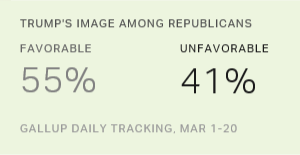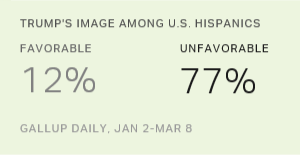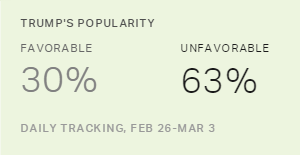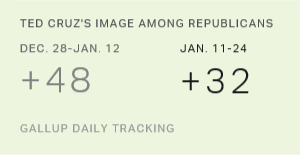Story Highlights
- Between 54% and 61% of Republicans have viewed Trump favorably since July
- Trump's image more negative than other GOP front-runners in previous years
- Republicans who view Trump positively are older, more likely to be men
PRINCETON, N.J. -- Republicans nationwide remain more positive than negative in their views of Donald Trump, with 55% viewing him favorably and 41% unfavorably so far in March. Despite Trump's extraordinary journey since last summer as the central -- and controversial -- focus of the 2016 election, Republicans' views of the billionaire businessman have generally held steady. His image today is roughly where it was last July.
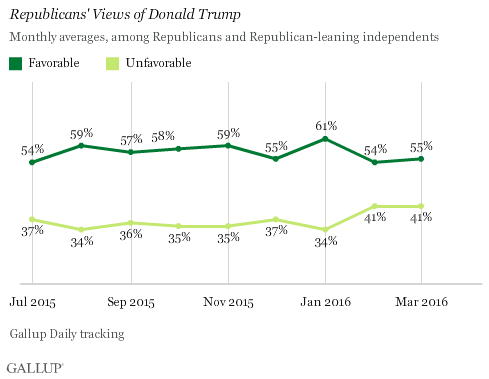
These trend data are based on Gallup Daily tracking of more than 1,600 Republicans who have rated Trump each month since July. Overall, Trump has averaged a 57% favorable rating and a 37% unfavorable rating among Republicans over that period. Since Trump's favorable rating peaked at 61% in January, it has been lower each of the past two months. But from a broad perspective, the month-to-month changes have been relatively minor.
The relative stability in Trump's favorable percentage -- ranging between 54% and 61% -- shows that his supporters are fairly locked into their support and are not dramatically affected by what Trump says or does, or by what the media and rival candidates say about him. This, in turn, may reflect that Trump was well-known early on, and that many Republicans formed a fairly firm opinion of him in the early stages of the campaign.
On a comparative basis, Trump's popularity among Republicans is roughly similar to where Mitt Romney was in February 2012 (59% favorable, 31% unfavorable), although fewer Republicans had an opinion of Romney four years ago, giving him a higher net favorable than Trump's today. In March of election years prior to that, the eventual Republican nominee had much higher favorable ratings among his own partisans, with John McCain in 2008, George W. Bush in 2000 and Bob Dole in 1996 all earning favorable ratings among Republicans in the 80% to 90% range.
Few Young, Female Republicans Are Pro-Trump
Opinions of Trump essentially divide the GOP into two segments -- the pro-Trump majority and the anti-Trump minority. This division is based on opinions of Trump and does not necessarily correlate with actual voting. But the opinion data can be used to examine the types of Republicans who like Trump and those who don't.
The age difference between the two groups is significant; 59% of pro-Trump Republicans are aged 50 and older, compared with 43% of the anti-Trump group.
Another key difference between the two groups is how older men and younger women in the GOP base react to Trump. A third of pro-Trump Republicans are men aged 50 and older, compared with 21% of anti-Trump Republicans. Likewise, 14% of pro-Trump Republicans are women aged 18 to 49, contrasted with 31% of anti-Trump Republicans.
| Gender/Age distribution of pro-Trump Republicans% | Gender/Age distribution of anti-Trump Republicans% | Gap between pro- and anti-Trump Republicans% | |||||||||||||||||||||||||||||||||||||||||||||||||||||||||||||||||||||||||||||||||||||||||||||||||
|---|---|---|---|---|---|---|---|---|---|---|---|---|---|---|---|---|---|---|---|---|---|---|---|---|---|---|---|---|---|---|---|---|---|---|---|---|---|---|---|---|---|---|---|---|---|---|---|---|---|---|---|---|---|---|---|---|---|---|---|---|---|---|---|---|---|---|---|---|---|---|---|---|---|---|---|---|---|---|---|---|---|---|---|---|---|---|---|---|---|---|---|---|---|---|---|---|---|---|---|
| Men aged 18 to 49 | 27 | 26 | 1 | ||||||||||||||||||||||||||||||||||||||||||||||||||||||||||||||||||||||||||||||||||||||||||||||||
| Men aged 50+ | 33 | 21 | 12 | ||||||||||||||||||||||||||||||||||||||||||||||||||||||||||||||||||||||||||||||||||||||||||||||||
| Women aged 18 to 49 | 14 | 31 | -17 | ||||||||||||||||||||||||||||||||||||||||||||||||||||||||||||||||||||||||||||||||||||||||||||||||
| Women aged 50+ | 26 | 22 | 4 | ||||||||||||||||||||||||||||||||||||||||||||||||||||||||||||||||||||||||||||||||||||||||||||||||
| March 1-20, 2016 | |||||||||||||||||||||||||||||||||||||||||||||||||||||||||||||||||||||||||||||||||||||||||||||||||||
| Gallup Daily tracking | |||||||||||||||||||||||||||||||||||||||||||||||||||||||||||||||||||||||||||||||||||||||||||||||||||
Pro-Trump Group Less Educated, Less Religious
Older Americans are less likely to be college graduates than those who are younger, and this relationship helps explain the finding that pro-Trump supporters -- who skew older -- are less well-educated. Twenty-seven percent of pro-Trump Republicans are college graduates, compared with 39% of anti-Trump Republicans. But education has at least some effect in each age group, and pro-Trump Republicans are proportionately more likely to be 35- to 54-year-old non-college graduates, in particular.
Additionally, pro-Trump Republicans are significantly less likely to be highly religious than their anti-Trump counterparts: 44% of Trump's Republican fans are highly religious versus 60% of his detractors.
The pro- and anti-Trump segments of the GOP differ modestly in terms of race and ethnicity. Within the constraints of the Republican Party's highly white skew, 91% of pro-Trump Republicans are non-Hispanic whites, compared with 81% of anti-Trump Republicans.
Implications
It is possible that Donald Trump will not secure enough delegates before July's Republican National Convention in Cleveland to have the nomination in hand when he arrives, leading to a contested convention. While some within the Republican Party are already plotting against Trump's nomination, a majority of the rank-and-file members of the party -- typically in the 55% to 60% range -- have a favorable view of the businessman, and this has been a persistent finding over the last nine months. Thus, there is by no means a majority negative reaction to Trump among Republicans nationwide, even though his image may be less robust at this point than other front-runners in past elections, and less robust than Hillary Clinton's is now among Democrats. Past Gallup research also indicates that Trump's image may improve if he were to become the presumptive nominee.
The pro-Trump segment of the GOP does have some distinctive demographic characteristics. Pro-Trump Republicans are older, more likely to be male, less well-educated, more likely to be non-Hispanic white and less religious than the anti-Trump group. But these differences are not huge, suggesting that Trump's appeal to Republicans goes beyond traditional demographic categories. Trump's consistently favorable rating among over half of Republicans most likely reflects a combination of psychological and emotional factors leading to differences in the way those in his party perceive his style, personality, nonpolitical background, business credentials and policy promises.
These data are available in Gallup Analytics.
Survey Methods
Results for this Gallup poll are based on telephone interviews conducted on a monthly basis from July 2015 to March 2016 on the Gallup U.S. Daily survey, with random monthly samples of between 1,640 and 2,587 Republicans and Republican-leaning independents, aged 18 and older, living in all 50 U.S. states and the District of Columbia. For results based on each month's total sample of Republicans, the margin of sampling error is ±3 percentage points at the 95% confidence level. All reported margins of sampling error include computed design effects for weighting.
Each sample of national adults includes a minimum quota of 60% cellphone respondents and 40% landline respondents, with additional minimum quotas by time zone within region. Landline and cellular telephone numbers are selected using random-digit-dial methods.
Learn more about how the Gallup U.S. Daily works.
